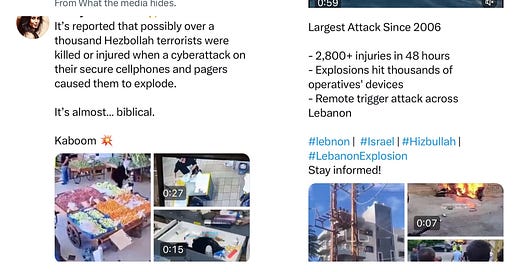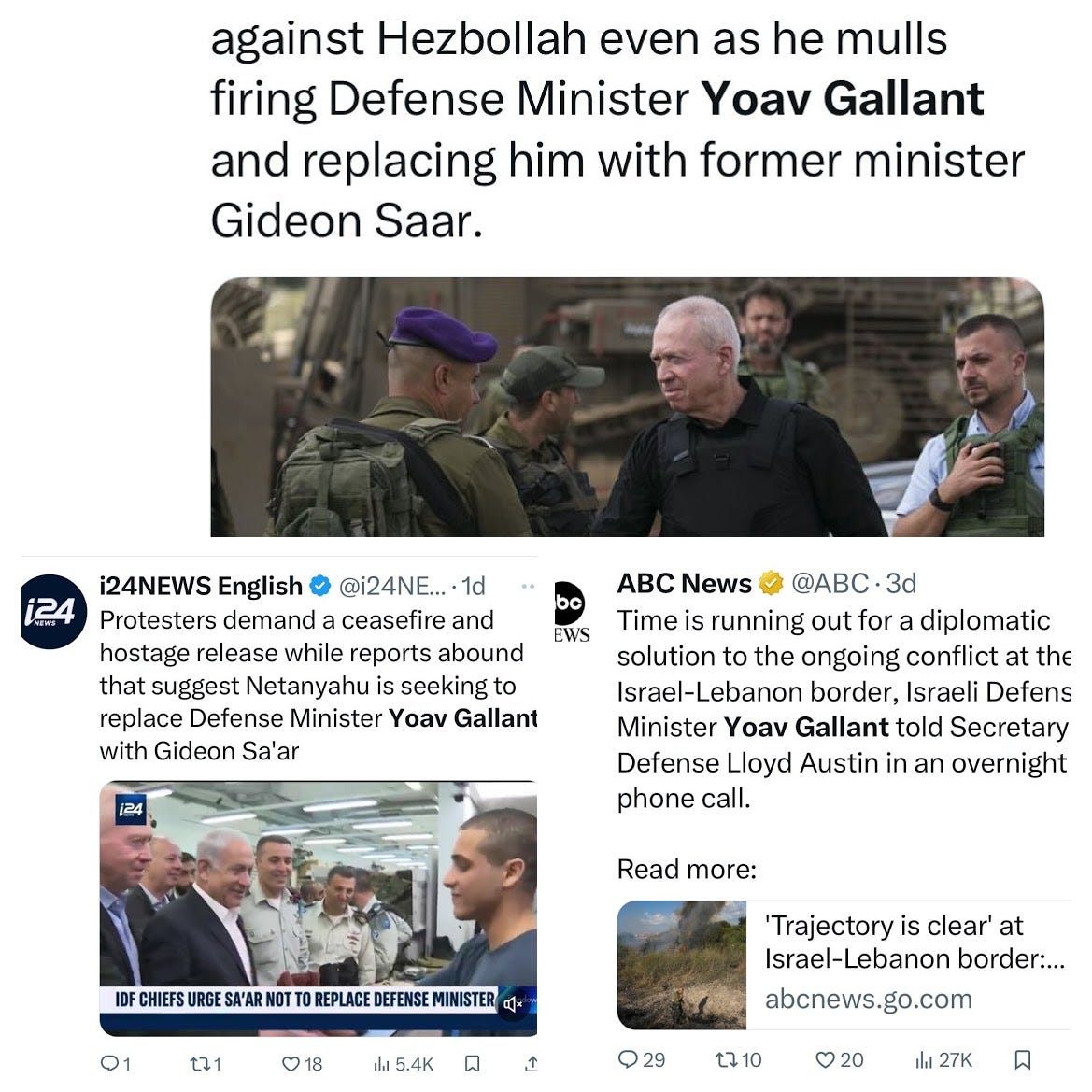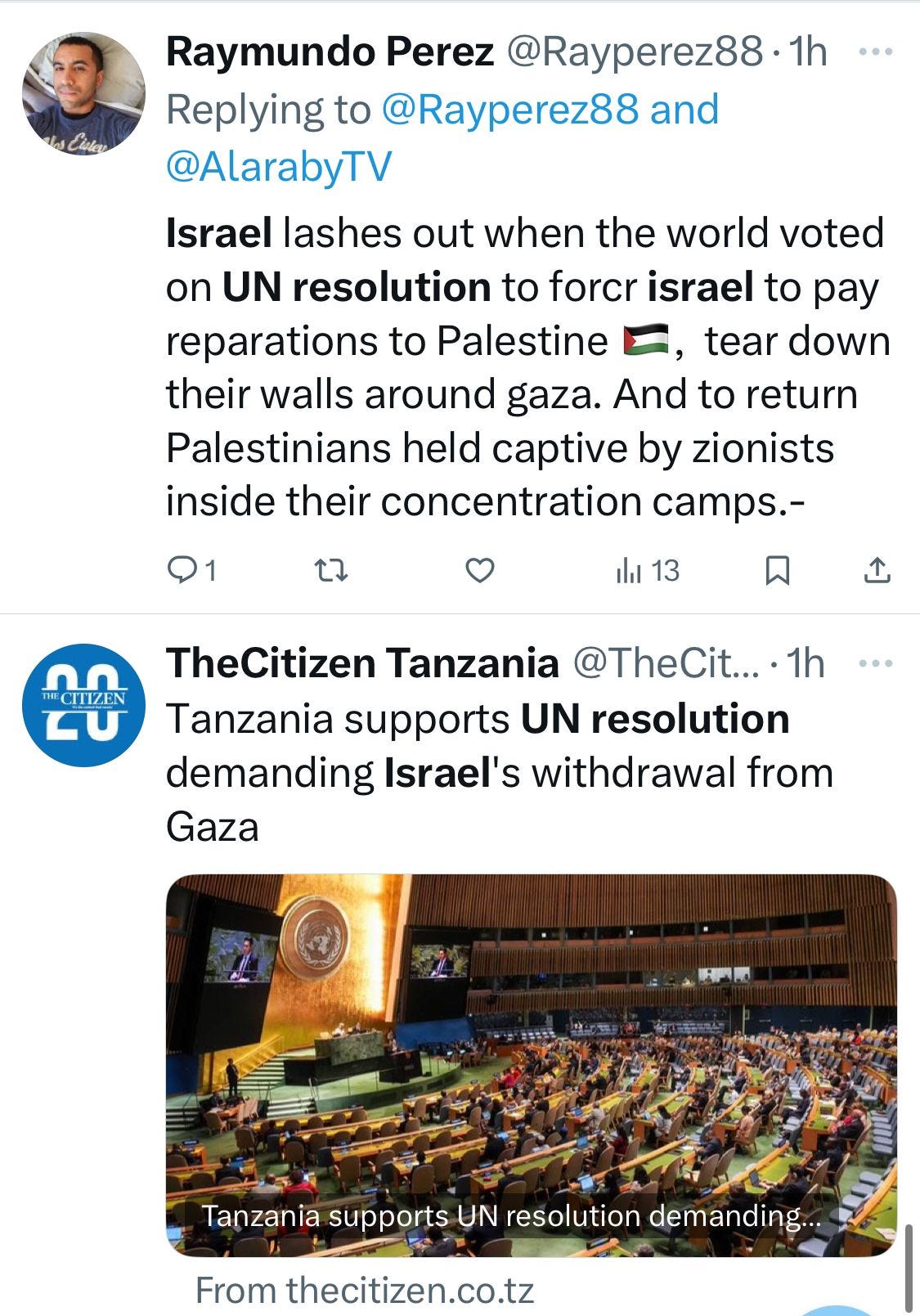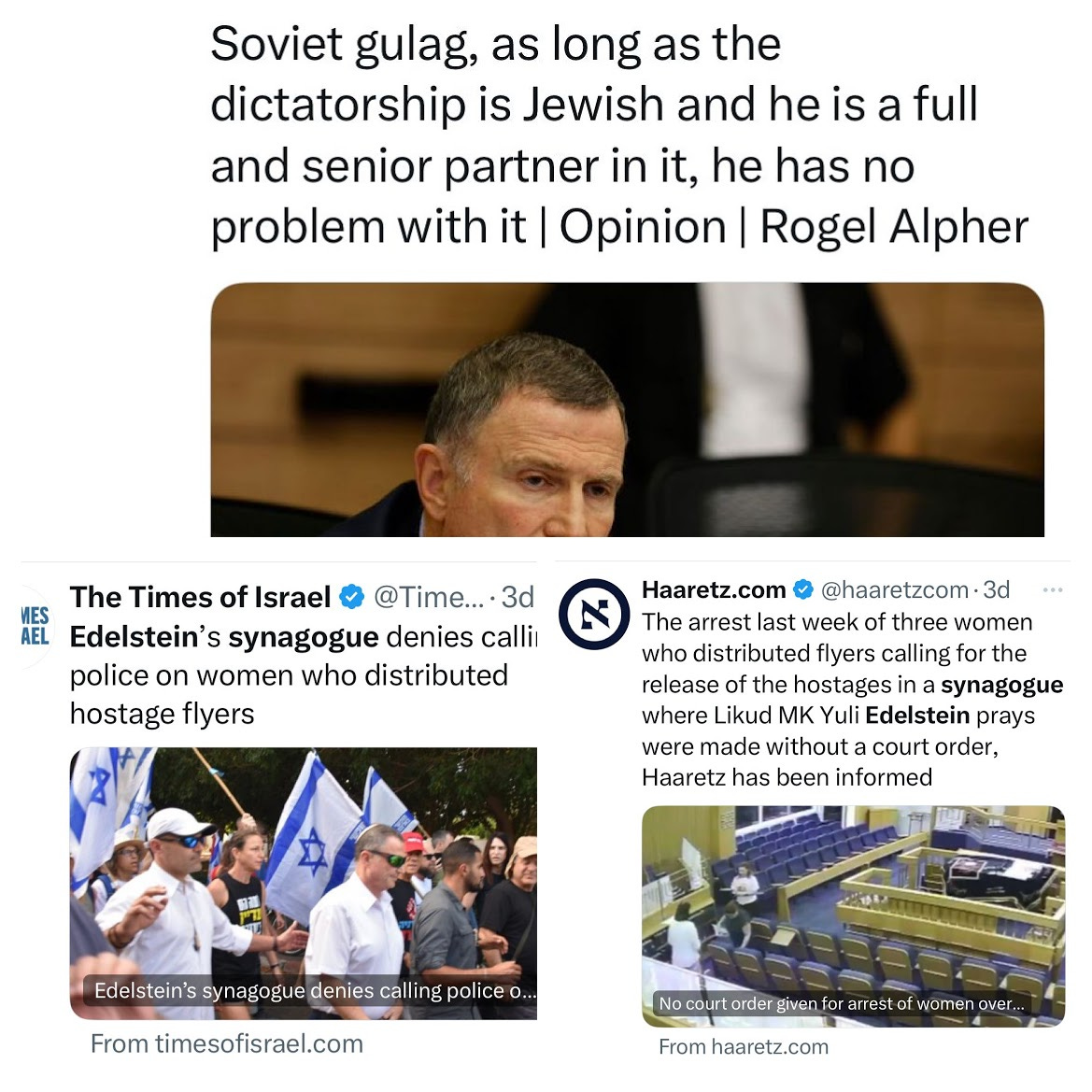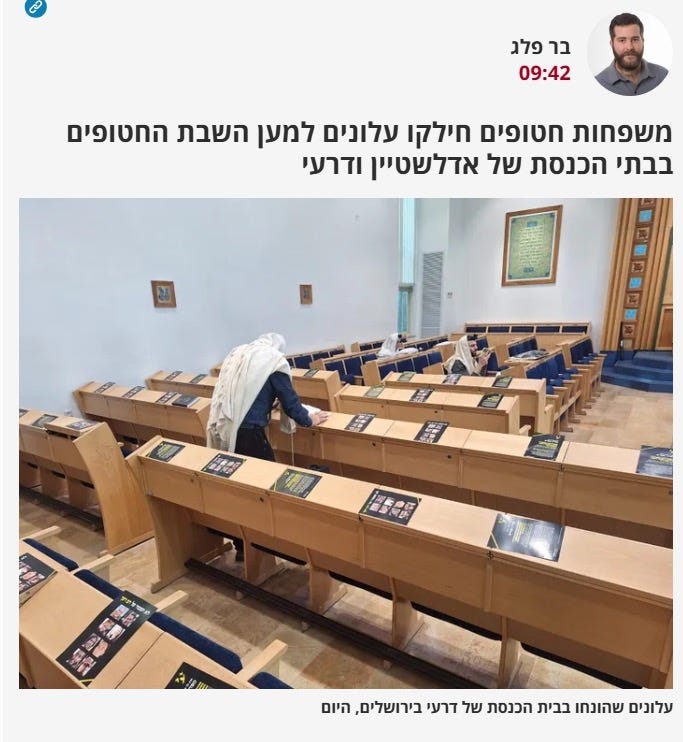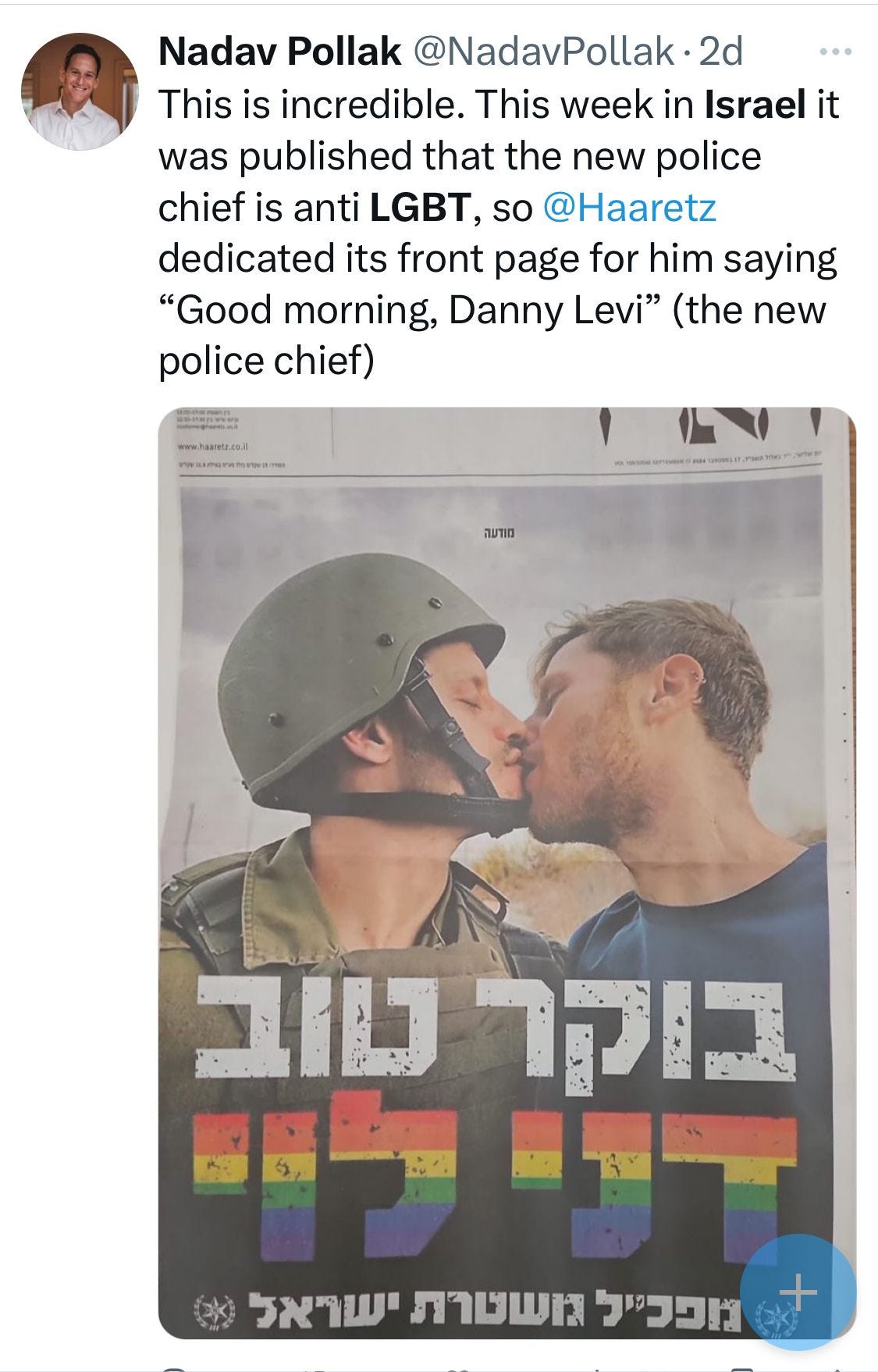Israel at War - Day 350
1. More than Three Thousand Hizbollah Members Seriously Injured by Explosions of Personal Communication Devices
In a sophisticated timely operation, thousands of personal communication devices exploded simultaneously in Lebanon, causing panic and mainly injuries for thousands of people, all of them, according to reports, are members of Hizbollah. This operation that was described everywhere as highly complicated, was based on excellent intelligence and operational abilities, is attributed to Israel. Official Israeli sources have not admitted that Israel is behind this operation. According to some international sources, this sophisticated operation needed to be planned months ahead. The success of the operation was based on the fact that Hizbollah instructed its people to use old time pagers and walkie-talkie devices for organizational communication. Those devices were purchased in a factory in Taiwan, and according to some reports, a Hungarian company was also involved. The New York Times claimed that Israel established the factory in order to prepare for this operation. A small amount of explosives was planted in each device during the production process, and a chip was modified to explode it remotely. Seconds before the explosions all of the targets received a pager message, so they were holding the device in their hands when it exploded.
Many analysts in Israel wonder about the timing of the operation, some assume that it was about to be exposed, so they had to execute it before exposure. Others claimed that it was meant to prevent the firing of the minister of defense that was on the table, and there were other speculations that were aired. The big question now is if, when, and how Hizbollah will decide to retaliate or will Israel start a full-scale war with Hizbollah in Lebanon, now that the southern front in Gaza requires fewer forces.
Late Thursday night Israel launched a massive air strike deep inside Lebanon, targeting Hizbollah bases and missile launchers. Hizbollah retaliated in heavy missile shelling towards northern Israel.
And, a Jewish Israeli was arrested under charges of treason. According to the police investigation the man was in close contact with an Iranian agent, who conspired with him to assassinate political figures in Israel.
2. A New Political Deal Threatens to Shake PM Netanyahu’s Coalition
Rumors inside PM Netanyahu's coalition took a more practical turn last week. Calls to fire the minister of defense Yoav Gallant strengthened in the last few days. Gallant doesn’t fully align with the policies of PM Netanyahu and often presents contradictory approaches as to how to manage the war on the different fronts Israel is involved with.
A new political deal that was revealed in the last few days includes the firing of Gallant, and assembling a new coalition that will include a small party from the opposition which will receive the ministry of defense. The head of this party, New Hope, Gideon Sa’ar, was once a senior member of the Likud, PM Netanyahu’s party. At one point Sa’at announced that he will compete with Netanyahu in an election campaign. He lost and became an outcast in the party, until he left, established a new party and joined the opposition. His return looks like a mini-earthquake in Israeli politics. Sa’ar is known for his stand against a hostages deal and he supports putting more pressure on Hamas. But at the last moment there was a substantial obstacle, Sara Netanyahu, the PM's wife, who does not want him as a minister of defense, because she doesn’t trust him after he ran against her husband. This is not the first time that Sara Netanyahu takes a decisive role in senior political and professional nominations, and it is not the first time that those nominations are based on personal loyalty to the Netanyahus.
This deal was put on hold for the time being due to the growing tension with Hizbollah, because Sa’ar is not qualified, doesn’t have substantial military experience, and the rejection by Sara Netanyahu.
3. UN Assembly Votes for Resolution Demanding that Israel End its "Unlawful Presence" in Gaza and the West Bank
By an overwhelming majority, the UN assembly adopted the Palestinian delegation’s resolution, demanding that Israel withdraw its military forces from the Occupied Palestinian Territories and evacuate all settlers within one year. The resolution also calls on member states to "take steps towards ceasing the importation of any products originating in the Israeli settlements, as well as the provision or transfer of arms, munitions and related equipment to Israel ... where there are reasonable grounds to suspect that they may be used in the Occupied Palestinian Territory."
The resolution follows a ruling by the International Court of Justice at The Hague in July, stipulating that Israel's presence in the Palestinian territories is unlawful and must end. The resolution also calls for an arms embargo on Israel and the monitoring of its implementation by the UN in three months’ time. 14 states, including the U.S., Israel, and Argentina, voted against the resolution, while 124 voted in favor, and 43 abstained.
Israel's ambassador to the UN, Danny Danon, called upon UN member states to reject the resolution, which he described as "an attempt to destroy Israel through diplomatic terrorism" that never mentions Hamas' atrocities and "ignores the truth, twists the facts and replaces reality with fiction."
U.S. Ambassador to the UN Linda Thomas Greenfield said in media interviews that the resolution has "a significant number of flaws," in that it undermines efforts to advance a two-state solution and fails to recognize that "Hamas is a terrorist organization" in control of Gaza, and that Israel has a right to defend itself.
While the UN assembly’s resolution has no practical implications, it can influence Israel’s political standing in the international arena.
Addressing the UN General Assembly earlier this week, Palestinian U.N. Ambassador Riyad Mansour said: "each country has a vote, and the world is watching us,". "Please stand on the right side of history. With international law. With freedom. With peace."
4. Three Women Detained for Handing Out Gaza Hostages Flyers in Coalition Members’ Synagogue
The three women were arrested on Friday, several hours before Shabbat, for placing flyers on seats calling for the hostages release the previous day. The flyers featured MK Yuli Edelstein (Likud), a former prisoner of Zion of the Soviet regime in the 1980’s, alongside photos of hostages and the slogan “Let my people go”. Edelstein is a member of the synagogue and prays there regularly. According to the police, the three women were arrested for conspiracy to commit a crime and breaking and entering into a synagogue, even though the synagogue, which is a public space, was open, and a private event was taking place in an adjacent room. Members of Edelstein’s congregation also disputed his claim that they were the ones to complain to the police.
The lawyer who represented the three activists said that the arrest was ‘politically motivated’ and criticized the need to handcuff his clients, model citizens with no criminal record, as if they were members of a criminal organization.
As soon as news of their arrest broke out, dozens of supporters arrived at the Herzliya police station where they were held overnight. Protests in their support continued the following day, when the three women, handcuffeded and shackled, were brought in front of a judge. They were released several hours later. The media later reported that the police arrested the three women without a court order, usually applied in the case of severe violent crimes, although the police had ample time to ask for it, even though the women had no criminal record and did not represent a threat. Following public criticism, the police internal affairs division announced that it had launched a probe into the case of the detention of the three women activists.
The arrest sparked broad public uproar in the media and on social media. The Hostages and Missing Families Forum issued a statement condemning the arrest of activists who sought to keep the issue of the hostages on the public agenda, stating “we regret that the police are being used by those who not only obstruct efforts to address the plight of the 101 hostages who have been held in captivity for 343 days, but are working and doing everything they can in order to thwart a hostage deal and silence dealing with the issue."
MK Yuli Edelstein sparked further public anger when he thanked the police for protecting him from ‘rioters’. He later said that some activists are using the hostages’ plight to advance other, unrelated, political causes.
5. Media Reports that Incoming Israeli Police Chief Made Homophobic Statements in Previous Role
Israel’s Channel 12 reported earlier this week that recently appointed police chief Daniel Levi, made homophobic comments while serving as Coastal District commander. In a conversation with the police spokesman, Levy said: 'I have nothing personal against [gay people], but I can't stand to see two men walking together in the street, holding hands or kissing'
The police chief came under fire following the report, in the media and on social media. In response, police told Channel 12 that Levi had “friendly and excellent relations with the LGBT community and its leaders, and has worked a lot to strengthen the police’s ties with them” throughout his career in law enforcement.
However, leaders of the Association for LGBTQ Equality in Israel said that such comments had no place in the police “or any other body responsible for the security of the members of the LGBTQ community.”
“We can only wonder whether LGBT-phobia was one of the criteria for choosing a new police chief. We invite the commissioner, if it does not disgust him too much, to sit with us and hear about the violence the members of the community experience because of the unprecedented incitement and hatred toward us in the last two years,” the organization added.
The police chief later met with the executive director of the association, “to restore the trust between the police and the LGBTQ+ community and develop a comprehensive workplan to address the police approach to the community.

